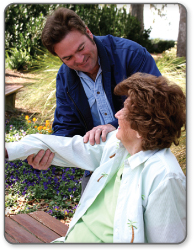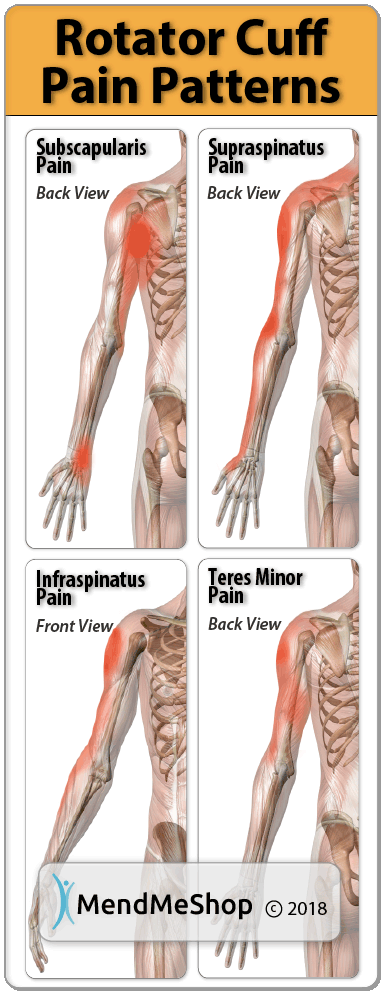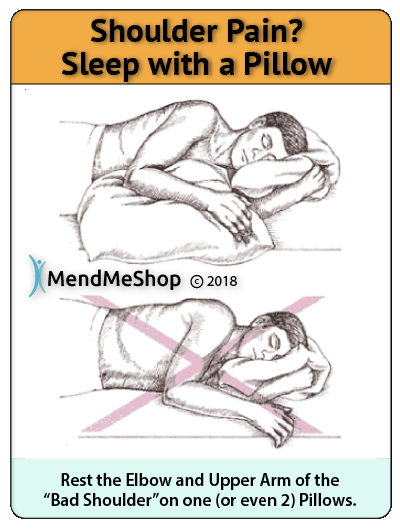
A symptom is an abnormality that a person recognizes themselves, for example pain or numbness in your shoulder. Everyone's experience is different; therefore symptoms are subjective and based on an individual basis.
If you have early stage rotator cuff inflammation or tendonitis you may only experience pain and other symptoms with strenuous activity. However, if you have a rotator cuff tear you may experience more weakness and targeted pain, which interferes with your ability to sleep at night and greatly affects your mobility. If you allow your pain to persist, you will eventually experience pain at rest or with no activity at all.

Pain in your rotator cuff may happen gradually and is normally associated with movement from repetitive activities, over-straining, or from degeneration of the tendon. It can also occur immediately following a trauma, such as a fall onto your arm or a lifting injury.
It is most aggravated and intensifies when doing overhead or forward reaching activities (throwing motions or reaching for objects).
An injury to the supraspinatus tendon will often result in rotator cuff pain on top of and along the outside of your shoulder. It can radiate down the outside of your upper arm reaching down to the thumb side of your forearm.
Subscapularis pain occurs at the back (posterior) shoulder, around the scapula area and can extend up to the top of the shoulder. Pain may also extend down the back (tricep area) of the arm.
If the infraspinatus tendon is injured, pain is felt at the front of the shoulder and deep within the shoulder joint. Depending on the severity, pain may reach down the outer part of the arm and into the hand.
Teres minor tendon pain develops in the back of the upper arm near the shoulder joint in a very localized area. Pain may extend up your arm or you may experience tingling all the way down to your fingers.
People with rotator cuff injuries generally find the pain becomes worse at night, especially when lying on the affected shoulder. This pain can range from mild, to moderate, to sharp, although it can be difficult to pinpoint.

Generally the amount of pain you experience will depend on the extent of your injury but in any situation you will probably find some relief if you use a pillow to support your arm while you sleep.
Weakness in your rotator cuff makes it difficult for you to raise your arm above your head, or extend your arm in front or to the side of you. You will often find it difficult to complete routine tasks such as reaching behind your back, putting your shirt on, or combing your hair. This is frequently noticed with complete rotator cuff tears.
The loss of mobility and/or decreased range of movement in your shoulder area can indicate a rotator cuff injury. This is often accompanied by stiffness in the joint area, which is sometimes referred to as "frozen shoulder".
Another key symptom of a rotator cuff injury is Crepitus (the clicking, grating, crackling or popping sounds heard and experienced in your shoulder joint when you move your upper arm around). This tends to result from two rough surfaces coming in contact and grinding against one another, especially where cartilage has worn away. These noises tend to occur when you are overexerting yourself, such as pushing a heavy object.
Recurring or constant inflammation and swelling around the Rotator Cuff or near a bone spur on your shoulder blade will also indicate an injury. Often this will be a result of tissue catching on the bone or being pinched between the bones.
If you have Rotator Cuff Tendinitis and Bursitis you will generally experience some of the above symptoms as well as red, sore, and swollen tendons or bursa. There is generally a gradual onset of pain, which flares up when you move your shoulder in any direction, especially overhead or out to the side.

Your ache will often originate from deep inside your shoulder and you will feel tenderness in a general area; this pain will often be worse at night.
A mild popping or crackling in your shoulder joint often indicates rotator cuff bursitis. As mentioned previously, if left untreated this can lead to a chronic tear. Rotator Cuff tendonitis and bursitis are very common in women 35 to 50 years of age.
If you have Rotator Cuff Instability you may feel your arm slipping in and out of your shoulder socket, and/or you may experience a "dead arm" feeling when you raise your arm over your head or move it away from your body. This Rotator Cuff instability may cause you to experience pain and unsteadiness. If you have a dislocation, your arm bone will slip or be forced out of the socket, resulting in immediate inflammation, loss of mobility, and a possible tear. This is very painful.
If you have a chronic or acute Rotator Cuff Strain or Tear you will experience most of the above symptoms. You will notice that your pain will be targeted in specific areas, especially when you lift your arm overhead or away from your body. You will also not be able to sleep on your injured shoulder. A strong crackling or popping sensation in your shoulder often indicates a tear.
If the tear occurs with a traumatic injury you may experience a sharp and sudden pain, a snapping sensation and an immediate weakness in your arm. This is known as an Acute Rotator Cuff tear. You will experience specific tenderness over the point of the tear and your range of motion will decrease immediately, as a result of muscle spasm, bleeding, or pain. You will also not be able to raise your arm out to your side without assistance. This sharp pain will generally last for a few days; however the other symptoms may carry on indefinitely. Rotator Cuff strains or tears occur most often in athletes and people over 50 years of age.
A Chronic Rotator Cuff tear is usually found on your dominant side and is worse at night, which will interrupt your sleep. You will notice that your shoulder muscles will weaken and atrophy (decrease in muscle mass), and the stiffness and pain in your shoulder will get worse over time. Your range of motion will also decrease until you are unable to lift your arm out to the side or over your head without assistance. This condition is very common in women, and generally affects people over the age of 40 years.
We always recommended seeking out professional medical advice as there are serious conditions related to the heart and lung that can mask itself as a shoulder problem. Furthermore, if you experience any of the symptoms below then it should be apparent to you that your shoulder problem will nto just go away:
Click HERE to Go To Our Online Store We take all major credit cards and Paypal.
If you have questions, call our office at 1-866-237-9608 (toll free continental US).
We are currently offering FREE SHIPPING and a 60 day trial period on all our Wraps.
Product specialists are available 9:00 am to 5:00 pm Eastern Standard Time Monday to Friday.
If any question or concern arises, call us or simply send us an email at any time (we check our emails constantly all throughout the day and night.. even on holidays!). We will respond as soon as possible.
Learn more about Shoulder Surgery and Post-Surgery Recovery
Learn more about about how the Circulatory Boost TShellz Wrap® helps with the healing process.
Learn more about which is better for your rotator/shoulder injury - ice or heat
During your recovery, you will probably have to modify and/or eliminate any activities that cause pain or discomfort at the location of your soft tissue injury until the pain and inflammation settle. The more diligent you are with your treatment and rehabilitation, the faster you will see successful results!
Please be aware that this information is neither intended nor implied to be a substitute for professional medical advice. CALL YOUR HEALTHCARE PROVIDER IMMEDIATELY IF YOU THINK YOU MAY HAVE A MEDICAL EMERGENCY. Always seek the advice of your physician or other qualified health provider before using any of our outstanding products to make sure they're right for you and your condition or if you have any questions regarding a medical condition. Always see your doctor for a proper diagnosis as there are often many injuries and conditions (some very serious) that could be the cause of your pain.
© 2025 In.Genu Design Group, Inc. Contact Us